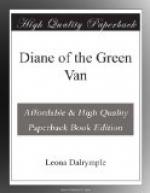The boy shifted a slim, bare leg and sniggered.
“Miss Westfall,” he said, “Miss Diane she says she’s a-goin’ to a spot by the river and camp a week an’—an’ if she finds anybody a-follerin’ or spyin’ on her from the farm, she’ll skin him alive an’—an’ them black eyes o’ her’n snapped fire when she said it. An’ Johnny, he’s got weepons ’nough with him to fight pirutes.”
Aunt Agatha groaned and rocking dolorously back and forth upon the porch reviewed the calamitous possibilities of the journey.
But the restless young nomad on the road ahead, sniffing the rare, sweet air of early summer, had already relegated the memory of her long-suffering aunt to the forgotten things of civilization. For the summer world, sweet with the scent of wild flowers, was very young, with young leaves, young grass and flowering, sun-warm hedges, and beyond the Sherrill place on the wooded hill, the sun flamed yellow through the hemlocks.
“Oh, Johnny Jutes! Oh, Johnny Jutes!” sang the girl happily, with the color of the wild rose in her sun-brown cheeks. “It’s good—it’s good to be alive!”
With a chuckle of enthusiasm Johnny cracked his whip and opined that it was.
Now even as the great green van rolled forth upon the country roads, bound for an idyllic spot by the river where Diane had planned to camp a week, two men appeared upon the wide, white-pillared Sherrill porch, smoking and idly admiring the bluish hills and the rolling meadowlands below bright with morning sunlight. To the east lay the silver glimmer of a tree-fringed lake; beyond, a church spire among the trees and a winding country road traveled by the solitary van of green and white.
“A singular conveyance, is it not, Poynter?” inquired the older man, his careful articulation blurred by a pronounced foreign accent. Staring intently at the sunlit road, he added: “Is it a common mode of travel—here in America?”
The younger man, a lean, sinewy chap with singularly fine eyes of blue above lean, tanned cheeks, frowned thoughtfully.
“By no means,” said he pleasantly. “Indeed it’s quite new to me. Seems to have blowy white things at the sides like window curtains, doesn’t it?”
“A nomadic young woman, I am told,” shrugged the older man carelessly. He stood watching the dusty trail of the nomad with narrowed, thoughtful eyes, unaware that his companion’s eyes had wandered somewhat expectantly to the Westfall lake.
“Baron Tregar!” whispered Ann Sherrill in a remote corner of the veranda to a girl she had brought up to the farm with her late the night before. “Has a real air of distinction, hasn’t he, Susanne? And such deep, dark, compelling eyes. Rather Arabic, I think, but mother says Magyar. Dick says he’s immensely interested in the war possibilities of aeroplanes and fearfully patriotic. Touring the States, I believe. Dad picked him up in Washington. Philip’s




